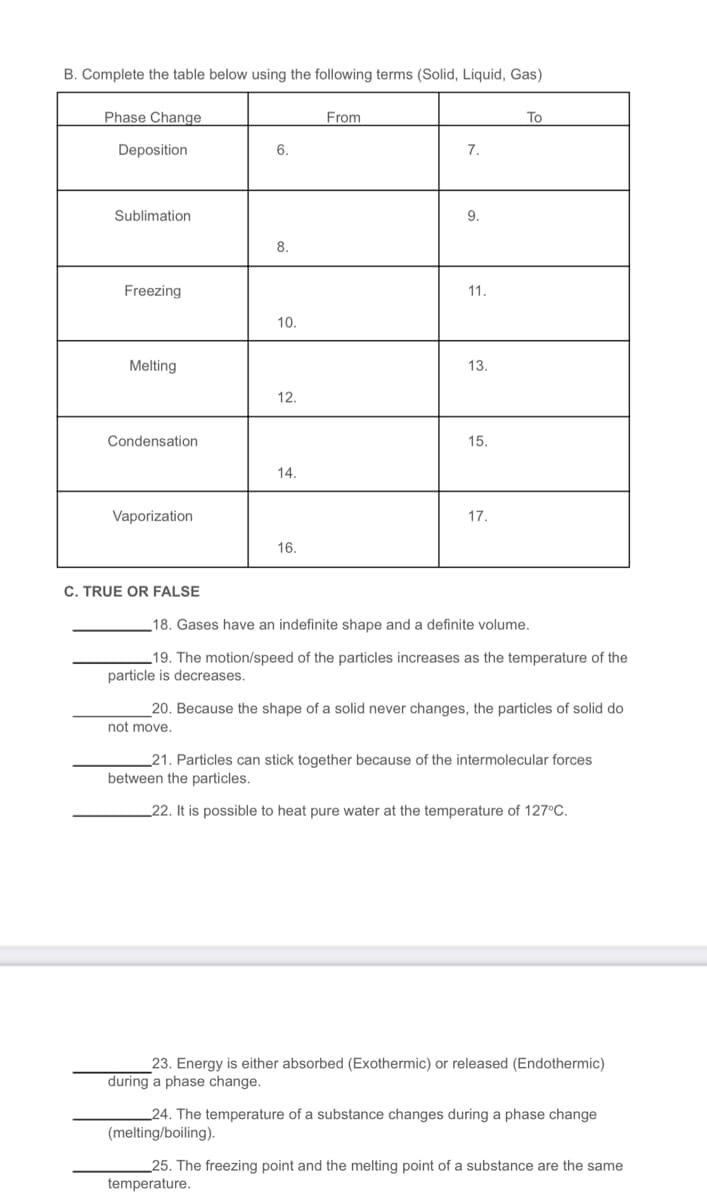B. Complete the table below using the following terms (Solid, Liquid, Gas) Phase Change From To Deposition 6. 7. Sublimation 9. 8. Freezing 11. 10. Melting 13. 12. Condensation 15. 14. Vaporization 17. 16. C. TRUE OR FALSE 18. Gases have an indefinite shape and a definite volume. 19. The motion/speed of the particles increases as the temperature of the particle is decreases. 20. Because the shape of a solid never changes, the particles of solid do not move. _21. Particles can stick together because of the intermolecular forces between the particles. _22. It is possible to heat pure water at the temperature of 127°C. 23. Energy is either absorbed (Exothermic) or released (Endothermic) during a phase change. _24. The temperature of a substance changes during a phase change (melting/boiling). _25. The freezing point and the melting point of a substance are the same temperature.
B. Complete the table below using the following terms (Solid, Liquid, Gas) Phase Change From To Deposition 6. 7. Sublimation 9. 8. Freezing 11. 10. Melting 13. 12. Condensation 15. 14. Vaporization 17. 16. C. TRUE OR FALSE 18. Gases have an indefinite shape and a definite volume. 19. The motion/speed of the particles increases as the temperature of the particle is decreases. 20. Because the shape of a solid never changes, the particles of solid do not move. _21. Particles can stick together because of the intermolecular forces between the particles. _22. It is possible to heat pure water at the temperature of 127°C. 23. Energy is either absorbed (Exothermic) or released (Endothermic) during a phase change. _24. The temperature of a substance changes during a phase change (melting/boiling). _25. The freezing point and the melting point of a substance are the same temperature.
Introductory Chemistry: An Active Learning Approach
6th Edition
ISBN:9781305079250
Author:Mark S. Cracolice, Ed Peters
Publisher:Mark S. Cracolice, Ed Peters
Chapter15: Gases,liquids, And Solids
Section: Chapter Questions
Problem 54E
Related questions
Question

Transcribed Image Text:B. Complete the table below using the following terms (Solid, Liquid, Gas)
Phase Change
From
To
Deposition
6.
7.
Sublimation
9.
8.
Freezing
11.
10.
Melting
13.
12.
Condensation
15.
14.
Vaporization
17.
16.
C. TRUE OR FALSE
18. Gases have an indefinite shape and a definite volume.
19. The motion/speed of the particles increases as the temperature of the
particle is decreases.
20. Because the shape of a solid never changes, the particles of solid do
not move.
21. Particles can stick together because of the intermolecular forces
between the particles.
_22. It is possible to heat pure water at the temperature of 127°C.
23. Energy is either absorbed (Exothermic) or released (Endothermic)
during a phase change.
_24. The temperature of a substance changes during a phase change
(melting/boiling).
_25. The freezing point and the melting point of a substance are the same
temperature.
Expert Solution
This question has been solved!
Explore an expertly crafted, step-by-step solution for a thorough understanding of key concepts.
This is a popular solution!
Trending now
This is a popular solution!
Step by step
Solved in 3 steps

Knowledge Booster
Learn more about
Need a deep-dive on the concept behind this application? Look no further. Learn more about this topic, chemistry and related others by exploring similar questions and additional content below.Recommended textbooks for you

Introductory Chemistry: An Active Learning Approa…
Chemistry
ISBN:
9781305079250
Author:
Mark S. Cracolice, Ed Peters
Publisher:
Cengage Learning

Chemistry: Matter and Change
Chemistry
ISBN:
9780078746376
Author:
Dinah Zike, Laurel Dingrando, Nicholas Hainen, Cheryl Wistrom
Publisher:
Glencoe/McGraw-Hill School Pub Co

Principles of Modern Chemistry
Chemistry
ISBN:
9781305079113
Author:
David W. Oxtoby, H. Pat Gillis, Laurie J. Butler
Publisher:
Cengage Learning

Introductory Chemistry: An Active Learning Approa…
Chemistry
ISBN:
9781305079250
Author:
Mark S. Cracolice, Ed Peters
Publisher:
Cengage Learning

Chemistry: Matter and Change
Chemistry
ISBN:
9780078746376
Author:
Dinah Zike, Laurel Dingrando, Nicholas Hainen, Cheryl Wistrom
Publisher:
Glencoe/McGraw-Hill School Pub Co

Principles of Modern Chemistry
Chemistry
ISBN:
9781305079113
Author:
David W. Oxtoby, H. Pat Gillis, Laurie J. Butler
Publisher:
Cengage Learning


Chemistry: An Atoms First Approach
Chemistry
ISBN:
9781305079243
Author:
Steven S. Zumdahl, Susan A. Zumdahl
Publisher:
Cengage Learning

Chemistry
Chemistry
ISBN:
9781305957404
Author:
Steven S. Zumdahl, Susan A. Zumdahl, Donald J. DeCoste
Publisher:
Cengage Learning